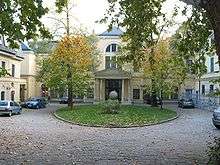Max Reinhardt Seminar
The Max Reinhardt Seminar (Reinhardt Seminar) is the School of Drama at the University of Music and Performing Arts in Vienna, Austria. It is located in the Palais Cumberland, Penzingerstraße 9, in Vienna's 14th district (48°11′21″N 16°18′44″E).

History
A Lehrgang für Declamation und Mimik (Course in Declamation and Mimics) had been in existence in Vienna since 1852, when Max Reinhardt received a call from the University of Music and Performing Arts in 1929 to create a drama seminar. Initially, this Seminar was taught at the Schlosstheater Schönbrunn, the imperial theatre in the Schönbrunn Palace. After Reinhardt's emigration in 1937, the seminar moved to the nearby Palais Cumberland in 1940. From 1948 until 1954, Helene Thimig (Reinhardt's widow) directed the Seminar.
Curriculum
The Seminar offers a four-year course taught by some 40 professors, many of whom are themselves notable actors and directors, e.g. Karlheinz Hackl, Heiner Müller, Oleg Tabakov, Giorgio Strehler, István Szabó, Klaus Maria Brandauer. After the second semester, the students specialize into various branches of acting and directing. Student performances are staged at the Schlosstheater.
Alumni
Famous past students include noted actors and filmmakers: Alfred Abel, Peter Alexander, Tonio Arango, David Bennent, Senta Berger, Marlene Dietrich, Martin Esslin, O. W. Fischer, Gustav Froehlich, Karlheinz Hackl, Monica Bleibtreu, Paul Henreid, Christiane Hörbiger, Kurt Kasznar, Hedy Lamarr, Francis Lederer, Ute Lemper, F. W. Murnau, Pola Negri, Hans Neuenfels, Susi Nicoletti, Christine Ostermayer, Erika Pluhar, Helmut Qualtinger, Leni Riefenstahl, Otto Schenk, Max Schreck, Walter Schmidinger, Otto Tausig, Nadja Tiller, Conrad Veidt, Christoph Waltz, Gustav von Wangenheim, Ilse Werner, Paula Wessely, Rudolf Wessely, and Peter Zinner.